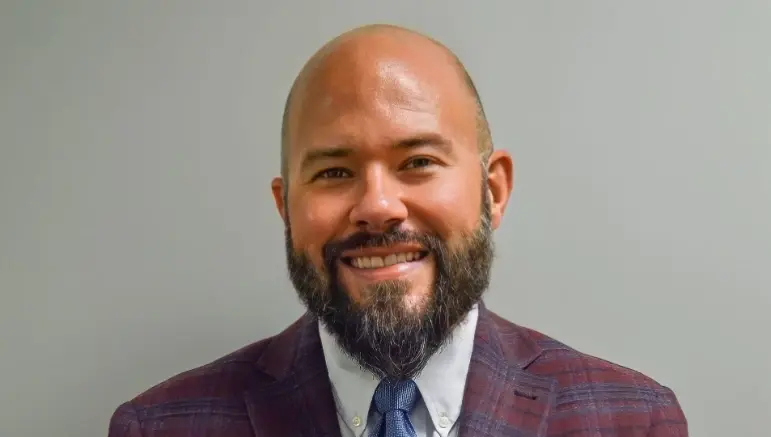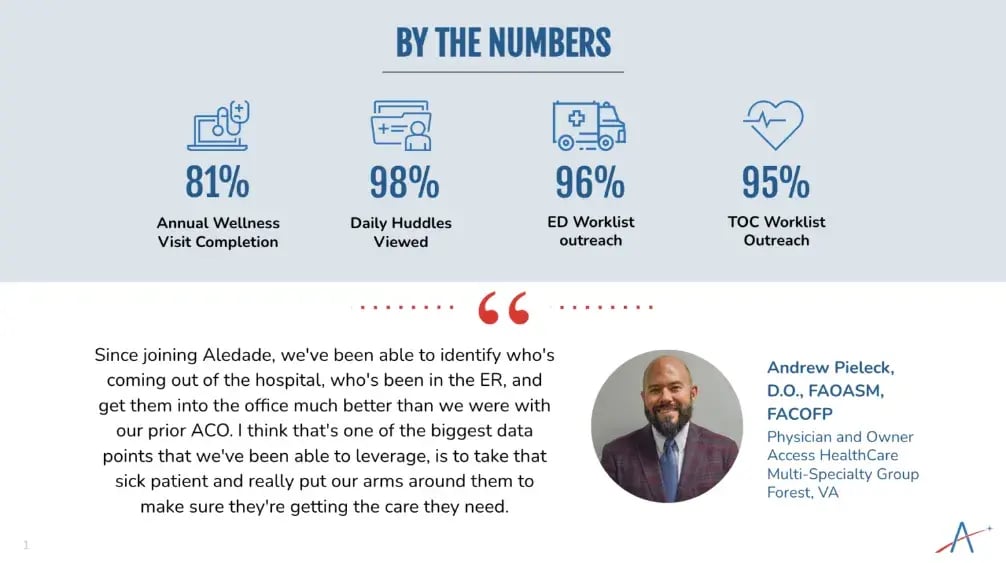Why Aledade: Q&A with Dr. Andrew Pieleck, Physician and Owner, Forest, Va.
July 19, 2024

Access HealthCare Multi-Specialty Group (AHMG), a multi-specialty practice in Forest, Va., has provided high-quality primary care to its surrounding community since 2000, and offers sports medicine as well.
AHMG made the switch from a different ACO partner to Aledade in 2020 and is excelling in quality measures, while also active in Aledade’s State Policy Committee and the Aledade FIRST program. Andrew Pieleck, D.O., FAOASM, FACOFP acquired AHMG in 2018 and has served as its owner and a physician in the practice since then.
What is AHMG’s background, and how has the practice grown in your community?
I’ve been working to grow the practice since I acquired it in 2018. It’s morphed into a family practice and sports medicine multi-specialty group, and we’ve brought on a direct primary care practice as well as a concierge practice. Everything has grown year over year, and we want to be very accessible to our patients – it’s in our name.
We have clerical staff, several medical assistants, and an X-ray tech in-house. Not only in the sports medicine world, but also in primary care, it’s great to be able to perform chest X-rays and other musculoskeletal films as well. That’s the makeup of our practice currently, and we’re certainly working to grow it as the workforce allows.
How has your experience with Aledade compared to your previous ACO partner?
Our previous ACO was hesitant to support our direct primary care and concierge efforts. They were a little more heavy-handed with the relationship than what we have with Aledade. As time went on, it was more like we were their employees, and I was not a fan of that, coming from the employed hospital world where you’re more of a number there as well.
Looking at the quality data, it wasn’t as robust and was not delivered as timely as what we’ve experienced with Aledade. There was more of a lag, and less information with our former partner.
What prompted you and your team to make the switch to Aledade?
We attended an Aledade webinar and expressed our concerns with our former ACO partner, and the things that turned us off. What we heard at the webinar was very much the opposite of that experience and validated what we were dealing with.
Health care is changing. There’s more balance of not only quantitatively how many patients you can see in a day and have on your panel, but also how well you can take care of them, and utilizing data to show that you are taking good care of your patients. There’s not a whole lot of doctors out there saying, “How can I do a mediocre job?” They’re saying, “How do we set ourselves up for success and have the right tools in the bag to be successful?”
AHMG joined Aledade at the height of the COVID-19 pandemic. Did you feel supported during this difficult time?
We qualified for the Paycheck Protection Program (PPP) money, and that really helped keep us afloat during those times. That was pretty important from March of 2020 to May of 2020 – we were hurting, and we didn’t want to lay off staff. But we never shut down. We never put anybody on a furlough or laid them off. We kept going, and I think that mentality was great for the staff. It was great for the patients to know, we’re still here to take care of you. We were always open for the patients.
AHMG recently joined our State Policy Committee in Virginia. What work are you hoping to do in the policy world?
We need reform for prior authorizations, and to get the insurance companies more out of the middle, especially as we take on more risk. The prior authorization process is probably a full time job in our office. That process utilizes too many resources, where we could be taking better care of patients and expanding services. It only hurts the patients and the practice that’s trying to take care of them. I’m hoping to see changes there.
How have Aledade’s technology solutions, like the Aledade App, supported AHMG?
We’ve integrated the Daily Huddle into our workflow, and that’s been probably the biggest support to determine risk, identify care gaps and to really engage the staff into that process. We get those diagnoses put into the chart, identify the care gaps and make it a smooth transition. When I go in to see the patient, I’m ready to address those diagnoses and the care gaps, and I’m not having to reinvent the wheel. It’s already there for me.
We’re able to be rewarded for the work we’re doing, as well as improve the quality of the care we’re able to deliver with the information that we have.

Since joining an Aledade ACO, how has AHMG benefited financially?
At AHMG, we try to share in the profits and the payouts that we get, not only on the quantitative end, but on the qualitative end as well within the practice. Sharing the fruits of our labor has really helped us be successful – it’s not just the owner that’s getting all the gold at the end of the rainbow. Everyone’s got some skin in the game, and we’re able to give out bonuses and give raises as those revenues increase.
We’ve gone through a pretty extensive expansion of the practice and a remodel of the existing space, and some of those funds have gone to that. It’s making an investment for the future growth that we’re trying to support here.
Has AHMG seen improved patient outcomes with their Aledade partnership?
Since joining Aledade, we’ve been able to identify who’s coming out of the hospital, who’s been in the ER, and get them into the office much better than we were with our prior ACO.
I think that’s one of the biggest data points that we’ve been able to leverage, is to take that sick patient and really put our arms around them to make sure they’re getting the care they need. We don’t want them to bounce back to the hospital or be readmitted – we want to provide great care so that they don’t have to utilize those more expensive services, and ultimately save money for the system as a whole. I don’t think anything compares to keeping patients out of the hospital.
As a mentor for the Aledade FIRST program, what has your experience been like, and what value does the program bring?
I’ve been mentoring and talking with a resident right now that’s interested in our neck of the woods when she completes her residency. I think Aledade FIRST is a great way to be a soundboard for a resident who is not going to have a lot of wisdom navigating contracts, or navigating the transition from residency to practice and what to expect.
I’m a listening ear on things that are frustrating them now, or what they’re looking for in a practice. A lot of times they don’t even know what they are looking for in a practice, so I try to give them some tips about the way health care is changing as far as reimbursement goes. I try to give them as much information and wisdom as I can so that they can make good decisions. It’s been great to be able to pass on some of the things I’ve learned since I became an attending physician.
What is your vision for Access HealthCare Multi-Specialty Group in the coming years? How will being part of an ACO support your goals?
The main word is: growth. We are in an area that is growing exponentially, and we have to have the health care system to support it. Our immediate needs are for more doctors, physician assistants, nurse practitioners and support staff – we want to be able to recruit and retain high-quality staff.
Looking at how we’re changing the way we’re compensated for the work we do, and the quantitative and qualitative sides of that, it’s pretty important to be in an ACO to be successful and meet the growth demands we’re seeing. We want to stay ahead of that curve, and if we’re going to do this work, we need to give it our best effort and put ourselves in the best position to be successful.
Connect with us!
Start planning your value-based care journey now
Thousands of your primary care peers are choosing Aledade as their value-based care partner. Let our experts show you why.
